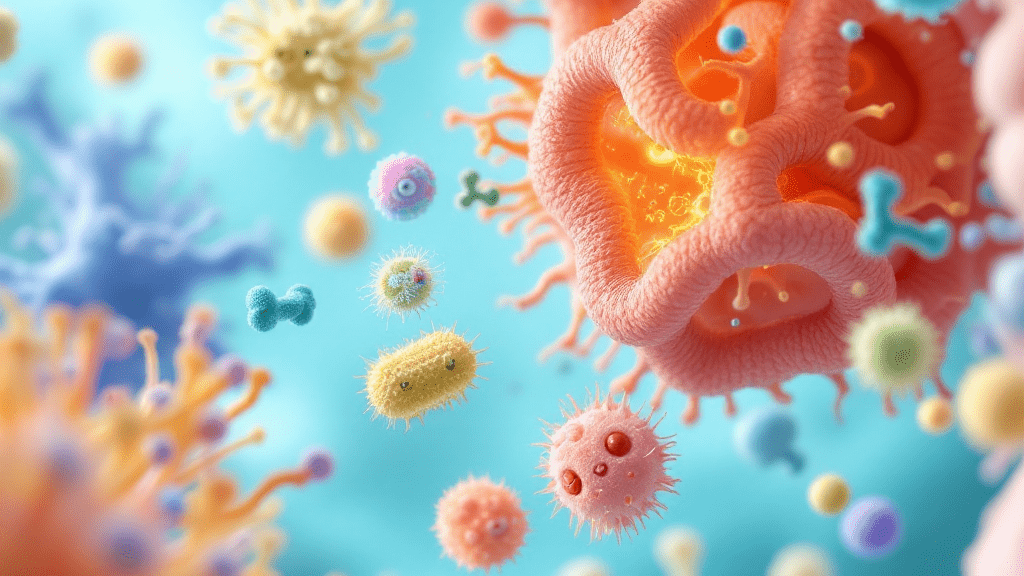Alterations in the gut microbiota have gained increasing recognition as a key contributor to the development and progression of both type 1 and type 2 diabetes. In particular, dysbiosis—a disruption in the normal balance and diversity of gut microbial communities—has been linked to a range of metabolic disturbances, including systemic inflammation, impaired glucose metabolism, and insulin resistance, all of which are central to the pathophysiology of diabetes (Baothman et al., 2016; Du et al., 2022; Gurung et al., 2020; Hamjane et al., 2023; Scheithauer et al., 2020; Yang et al., 2021; Zhou et al., 2022).
Individuals with diabetes frequently exhibit reduced microbial diversity and a shift in the composition of gut bacteria toward a more pro-inflammatory profile. This microbial imbalance contributes to chronic low-grade inflammation and immune dysregulation, which further exacerbate insulin resistance and metabolic dysfunction (Baothman et al., 2016; Du et al., 2022; Gurung et al., 2020; Hamjane et al., 2023; Scheithauer et al., 2020; Yang et al., 2021; Zhou et al., 2022).
Dysbiosis has also been implicated in the weakening of intestinal barrier function, increasing gut permeability and facilitating the translocation of microbial products, such as lipopolysaccharides (LPS), into the systemic circulation. This condition, known as metabolic endotoxemia, further drives inflammation and can impair pancreatic β-cell function, contributing to both insulin deficiency and resistance (Bielka et al., 2022; Del Chierico et al., 2022; Scheithauer et al., 2020; Yang et al., 2021; Zhou et al., 2022).
Moreover, the gut microbiota plays a direct role in host metabolism through the production of microbial metabolites, particularly short-chain fatty acids (SCFAs) such as butyrate, propionate, and acetate. These SCFAs support intestinal health, modulate immune responses, and help regulate glucose homeostasis. In individuals with diabetes, the abundance of SCFA-producing bacteria is often reduced, while pro-inflammatory taxa are elevated, aggravating metabolic dysfunction (Baothman et al., 2016; Chong et al., 2025; Du et al., 2022; Gurung et al., 2020; Hamjane et al., 2023; Wu et al., 2020).
With mounting evidence linking gut microbiota to the development of diabetes, a growing number of microbiome-focused therapeutic strategies are being explored for both its prevention and management. These interventions include prebiotics, probiotics, dietary modifications, microbial metabolites, and even fecal microbiota transplantation. The common goal? To rebalance the gut ecosystem and improve metabolic health by enhancing insulin sensitivity, regulating glucose levels, and modulating inflammation — key pathways in the pathogenesis of diabetes (Baars et al., 2024; Crăciun et al., 2022; Crudele et al., 2023; Du et al., 2022; Iatcu et al., 2021; Yang et al., 2021; Zhou et al., 2022).
REFERENCES
Baars, D., Fondevila, M., Meijnikman, A., & Nieuwdorp, M. (2024). The central role of the gut microbiota in the pathophysiology and management of type 2 diabetes. Cell Host & Microbe, 32(8), 1280–1300. https://doi.org/10.1016/j.chom.2024.07.017
Baothman, O., Zamzami, M., Taher, I., Abubaker, J., & Abu-Farha, M. (2016). The role of gut microbiota in the development of obesity and diabetes. Lipids in Health and Disease, 15, 108. https://doi.org/10.1186/s12944-016-0278-4
Bielka, W., Przezak, A., & Pawlik, A. (2022). The role of the gut microbiota in the pathogenesis of diabetes. International Journal of Molecular Sciences, 23(1), 480. https://doi.org/10.3390/ijms23010480
Chong, S., Lin, M., Chong, D., Jensen, S., & Lau, N. (2025). A systematic review on gut microbiota in type 2 diabetes mellitus. Frontiers in Endocrinology, 15, 1486793. https://doi.org/10.3389/fendo.2024.1486793
Crăciun, C., Neag, M., Cătinean, A., Mitre, A., Rusu, A., Bala, C., Roman, G., Buzoianu, A., Muntean, D., & Crăciun, A. (2022). The relationships between gut microbiota and diabetes mellitus, and treatments for diabetes mellitus. Biomedicines, 10(2), 308. https://doi.org/10.3390/biomedicines10020308
Crudele, L., Gadaleta, R., Cariello, M., & Moschetta, A. (2023). Gut microbiota in the pathogenesis and therapeutic approaches of diabetes. EBioMedicine, 97, 104821. https://doi.org/10.1016/j.ebiom.2023.104821
Del Chierico, F., Rapini, N., Deodati, A., Matteoli, M., Cianfarani, S., & Putignani, L. (2022). Pathophysiology of type 1 diabetes and gut microbiota role. International Journal of Molecular Sciences, 23(23), 14650. https://doi.org/10.3390/ijms232314650
Du, L., Li, Q., Yi, H., Kuang, T., Tang, Y., & Fan, G. (2022). Gut microbiota-derived metabolites as key actors in type 2 diabetes mellitus. Biomedicine & Pharmacotherapy, 149, 112839. https://doi.org/10.1016/j.biopha.2022.112839
Gurung, M., Li, Z., You, H., Rodrigues, R., Jump, D., Morgun, A., & Shulzhenko, N. (2020). Role of gut microbiota in type 2 diabetes pathophysiology. EBioMedicine, 51, 102590. https://doi.org/10.1016/j.ebiom.2019.11.051
Hamjane, N., Mechita, M., Nourouti, N., & Barakat, A. (2023). Gut microbiota dysbiosis-associated obesity and its involvement in cardiovascular diseases and type 2 diabetes: A systematic review. Microvascular Research, 104601. https://doi.org/10.1016/j.mvr.2023.104601
Han, H., Li, Y., Fang, J., Liu, G., Yin, J., Li, T., & Yin, Y. (2018). Gut microbiota and type 1 diabetes. International Journal of Molecular Sciences, 19(4), 995. https://doi.org/10.3390/ijms19040995
Iatcu, C., Steen, A., & Covașă, M. (2021). Gut microbiota and complications of type-2 diabetes. Nutrients, 14(1), 166. https://doi.org/10.3390/nu14010166
Jamshidi, P., Hasanzadeh, S., Tahvildari, A., Farsi, Y., Arbabi, M., Mota, J., Sechi, L., & Nasiri, M. (2019). Is there any association between gut microbiota and type 1 diabetes? A systematic review. Gut Pathogens, 11, 47. https://doi.org/10.1186/s13099-019-0332-7
Scheithauer, T., Rampanelli, E., Nieuwdorp, M., Vallance, B., Verchere, C., Raalte, D., & Herrema, H. (2020). Gut microbiota as a trigger for metabolic inflammation in obesity and type 2 diabetes. Frontiers in Immunology, 11, 571731. https://doi.org/10.3389/fimmu.2020.571731
Wu, H., Tremaroli, V., Schmidt, C., Lundqvist, A., Olsson, L., Krämer, M., Gummesson, A., Perkins, R., Bergström, G., & Bäckhed, F. (2020). The gut microbiota in prediabetes and diabetes: A population-based cross-sectional study. Cell Metabolism, 32(3), 379–390.e5. https://doi.org/10.1016/j.cmet.2020.06.011
Yang, G., Wei, J., Liu, P., Zhang, Q., Tian, Y., Hou, G., Meng, L., Xin, Y., & Jiang, X. (2021). Role of the gut microbiota in type 2 diabetes and related diseases. Metabolism: Clinical and Experimental, 117, 154712. https://doi.org/10.1016/j.metabol.2021.154712

